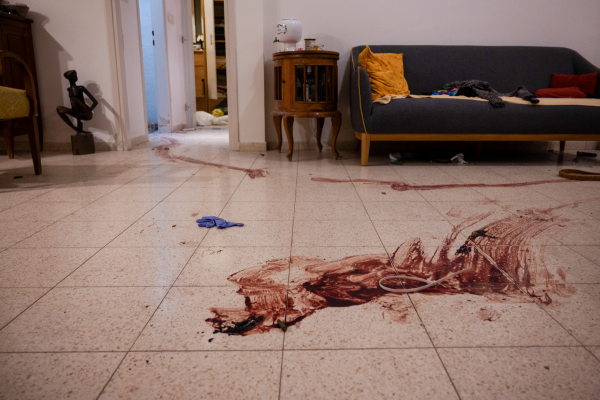Before October 7, I was quite certain that the systematic murder of 6 million Jews, including 1.5 million children, would have caused people of good will throughout the world — had they witnessed it in real time — to pressure their governments to put an end to it. Now, I’m not so sure.
By Meryl Ain, Algemeiner
A month after Hamas terrorists brutally murdered more than 1,400 innocent Israelis and kidnapped another 240 blameless human beings, it appears that much of the world has moved on.
Despite the fact that women were raped, families were executed, children were burnt, and elderly and disabled people were massacred, the media is only focusing on what’s happening now in Gaza — ignoring that if Hamas had the chance, they would commit those atrocities over and over again, and ignoring that Israel is still under attack from Hamas rockets and threats and assaults from its neighbors.
I, for one, cannot get the photo of the sweet nine-month-old Kfir Bibas out of my mind. He is now, sickeningly, a hostage in Gaza.
I’ve spent much of my life researching, teaching, and writing about the Holocaust, and I have often asked myself the following questions:
-What if World War II had been carried live throughout the world?
-What if citizens of the world had watched Jews being rounded up, beaten, humiliated, starved in a ghetto, and worked to death or exterminated in concentration camps?
-Would the world have condoned the separation of babies and children from their mothers?
-Would it have rallied in support of the Jews?
Before October 7, I was quite certain that the systematic murder of 6 million Jews, including 1.5 million children, would have caused people of good will throughout the world — had they witnessed it in real time — to pressure their governments to put an end to it. Now, I’m not so sure.
What would World War II have looked like on 24/7 cable news channels or even social media?
Let’s consider the bombing of Dresden, which has been called the Florence on the Elbe because of its location on the Elbe River and its historical role as a center for the arts and striking architecture — much like Florence, Italy.
From February 13-15, 1945, the United States Army Air Force and the Royal Air Force (RAF) dropped more than 3,900 tons of high explosive bombs and incendiary devices on the city. Twenty-five thousand people were killed and 70 percent of the city’s buildings were destroyed. The bombing remains controversial, even in the post-war period. Two United States Air Force reports, published in 1953 and again in 1954, defended the operation as the justified bombing of a strategic target.
How would cable TV and social media have covered the Dresden bombing had there been no censorship? What would have been the world reaction as pro-Nazi demonstrators marched throughout the world protesting American and British killing of civilians?
It would have likely evoked sympathy because most human beings are outraged by the killing of civilians. In the meantime, Leni Riefenstahl would have been creating and choreographing beautifully crafted, but misleading — and heavily censored — films of the Nazi war effort. Might it have changed the outcome of the war?
The ADL says that antisemitic incidents are up 400 percent, and we see college students supporting the Hamas massacre and sharing incorrect information they’ve seen on social media. For Jews throughout the world, the Hamas attack evokes the Holocaust.
Kristallnacht was a wave of coordinated antisemitic violence that took place in Nazi Germany and Austria on November 9 and 10, 1938 — more than a year before the onset of the war. Hundreds of synagogues were set on fire and Jewish cemeteries were desecrated. The windows of Jewish-owned stores were smashed and desecrated with swastikas and antisemitic slogans. The Nazis broke into Jewish homes and terrorized those living there. Rioters attacked and killed Jews on the street.
The world reported on it, but then as now, most quickly lost interest. Going forward, the mainstream press for the most part relegated stories of antisemitic violence to the back pages below the fold. Typically, those who read Jewish newspapers were better informed, but back then there was time for fact-checking and corroborating information. There is no such time lag now. As we have seen, mainstream media outlets can take a Hamas report and broadcast it as fact.
The truth is that there are not enough Jews in America, Israel, or throughout the world to fight this war alone. Jews the world over need and appreciate the support of all those who care about freedom.
I am reminded of the words of the late Rabbi Lord Jonathan Sacks: “Jews cannot fight antisemitism alone. The victim cannot cure the crime. The hated cannot cure the hate. It would be the greatest mistake for Jews to believe that they can fight it alone. The only people who can successfully combat antisemitism are those active in the cultures that harbour it.”
This is a moment of reckoning for the free world; we will see how they respond.
Meryl Ain is the author of two post-Holocaust novels, Shadows We Carry and The Takeaway Men, which are available on Amazon. A member of the International Board for Holocaust Survivor Day, she is the host of the podcast “People of the Book” on the Authors on the Air Global Radio Network and the founder of Facebook’s “Jews Love to Read!”
